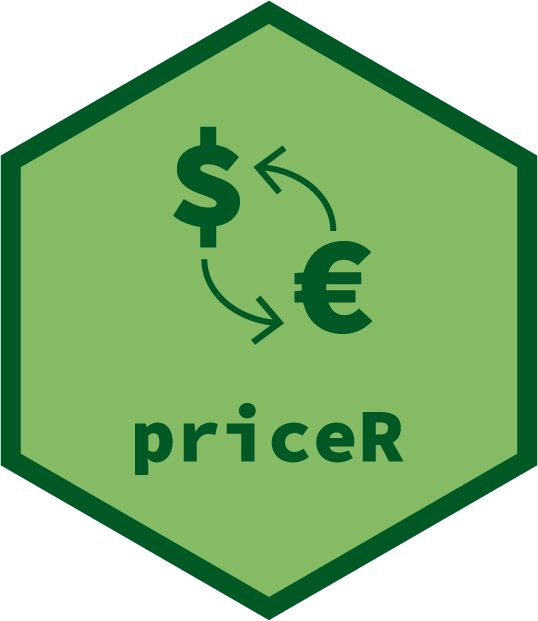

priceR contains 4 types of capabilties:
Installation via CRAN install.packages("priceR")
library(priceR)
library(tidyverse)
options(scipen = 100); options(digits = 6)Works for 170 currencies
exchange_rate_latest("USD") %>%
head(10)## Daily USD exchange rate as at end of day 2022-06-17 GMT
## currency one_usd_is_equivalent_to
## 1 AED 3.66982
## 2 AFN 89.28219
## 3 ALL 113.54182
## 4 AMD 421.88487
## 5 ANG 1.80190
## 6 AOA 433.64088
## 7 ARS 122.82785
## 8 AUD 1.42343
## 9 AWG 1.79911
## 10 AZN 1.69928currencies() %>%
head()## description code
## 1 United Arab Emirates Dirham AED
## 2 Afghan Afghani AFN
## 3 Albanian Lek ALL
## 4 Armenian Dram AMD
## 5 Netherlands Antillean Guilder ANG
## 6 Angolan Kwanza AOA# Retieve AUD to USD exchange rates
au <- historical_exchange_rates("AUD", to = "USD",
start_date = "2010-01-01", end_date = "2020-06-30")
# Retieve AUD to EUR exchange rates
ae <- historical_exchange_rates("AUD", to = "EUR",
start_date = "2010-01-01", end_date = "2020-06-30")
# Combine
cur <- au %>% left_join(ae, by = "date")
head(cur)## date one_AUD_equivalent_to_x_USD one_AUD_equivalent_to_x_EUR
## 1 2010-01-01 0.898084 0.624103
## 2 2010-01-02 0.898084 0.624103
## 3 2010-01-03 0.898084 0.624103
## 4 2010-01-04 0.912623 0.632711
## 5 2010-01-05 0.912011 0.634840
## 6 2010-01-06 0.920736 0.639223library(ggplot2)
library(ggthemes)
library(ggrepel)
cur %>%
rename(aud_to_usd = one_AUD_equivalent_to_x_USD,
aud_to_eur = one_AUD_equivalent_to_x_EUR) %>%
pivot_longer(c("aud_to_usd", "aud_to_eur")) %>%
mutate(date = as.Date(date)) %>%
ggplot(aes(x=date, y = value, colour=name)) +
geom_line(size=1) +
scale_color_manual(
breaks = c("aud_to_usd", "aud_to_eur"), # Sets order in legend
labels = c( "AUD to USD", "AUD to EUR"), # Pretty names in legend
values = c("#02506A", "#03A5DC") # Sets line/legend colours
) +
scale_x_date(date_labels = "%b %Y", date_breaks = "6 month") +
scale_y_continuous(
expand = c(0, 0),
limits = c(0, 1.5)
) +
labs(
title = "AUD to USD and EUR 2010 to 2020",
subtitle = "Plotting the Australian Dollar against the USD and Euro",
y = "Exchange Rate"
) +
theme_economist() +
theme(
plot.title = element_text(size = 18, margin=margin(0,0,8,0)),
axis.title.x = element_blank(),
axis.ticks.x = element_blank(),
axis.text.x = element_text(angle = 90, vjust = 0.5, hjust=1),
axis.title.y = element_text(vjust = 3.5),
legend.position="bottom",
legend.title = element_blank()
) 
cur %>%
tail(200) %>%
rename(aud_to_usd = one_AUD_equivalent_to_x_USD,
aud_to_eur = one_AUD_equivalent_to_x_EUR) %>%
mutate(date = as.Date(date)) %>%
ggplot(aes(x = date, y = aud_to_usd, group = 1)) +
geom_line(colour = "#F15B40") +
geom_smooth(method = 'loess', colour="#03A5DC") +
scale_x_date(date_labels = "%b %Y", date_breaks = "1 month") +
labs(
title = "AUD to USD over last 200 days",
subtitle = "AUD to USD Exchange Rate; Polynomial regression trendline",
y = "Exchange Rate"
) +
theme_economist() +
theme(
plot.title = element_text(size = 18, margin=margin(0,0,8,0)),
axis.title.x = element_blank(),
axis.ticks.x = element_blank(),
axis.text.x = element_text(angle = 90, vjust = 0.5, hjust=1),
axis.title.y = element_text(vjust = 3.5),
legend.position="bottom",
legend.title = element_blank()
) 
cur %>%
tail(365 * 8) %>%
rename(aud_to_usd = one_AUD_equivalent_to_x_USD,
aud_to_eur = one_AUD_equivalent_to_x_EUR) %>%
mutate(date = as.Date(date)) %>%
ggplot(aes(x = date, y = aud_to_eur, group = 1)) +
geom_line() +
geom_smooth(method = 'loess', se = TRUE) +
geom_line(colour = "#02506A") +
geom_smooth(method = 'loess', colour="#03A5DC") +
scale_x_date(date_labels = "%Y", date_breaks = "1 year") +
labs(
title = "AUD to EUR over last 8 years",
subtitle = "AUD to EUR Exchange Rate; Polynomial regression trendline",
y = "Exchange Rate"
) +
theme_economist() +
theme(
plot.title = element_text(size = 18, margin=margin(0,0,8,0)),
axis.title.x = element_blank(),
axis.ticks.x = element_blank(),
axis.text.x = element_text(angle = 90, vjust = 0.5, hjust=1),
axis.title.y = element_text(vjust = 3.5),
legend.position="bottom",
legend.title = element_blank()
) 
adjust_for_inflation() automatically converts between
nominal and real dollars, or in/deflates prices from one year’s prices
to another’s.
It works for any of 304 countries / areas. See them with all with
show_countries()
set.seed(123)
nominal_prices <- rnorm(10, mean=10, sd=3)
years <- round(rnorm(10, mean=2006, sd=5))
df <- data.frame(years, nominal_prices)
df$in_2008_dollars <- adjust_for_inflation(nominal_prices, years, "US", to_date = 2008)## Generating URL to request all 299 results
## Retrieving inflation data for US
## Generating URL to request all 62 resultsdf## years nominal_prices in_2008_dollars
## 1 2012 8.31857 7.66782
## 2 2008 9.30947 9.30947
## 3 2008 14.67612 14.67612
## 4 2007 10.21153 10.60356
## 5 2003 10.38786 12.15782
## 6 2015 15.14519 13.26473
## 7 2008 11.38275 11.38275
## 8 1996 6.20482 8.51713
## 9 2010 7.93944 7.67319
## 10 2004 8.66301 9.87471extract_salary() extracts salaries as useful numeric
data from non-standard free text
messy_salary_data <- c(
"$90000 - $120000 per annum",
"$90k - $110k p.a.",
"$110k - $120k p.a. + super + bonus + benefits",
"$140K-$160K + Super + Bonus/Equity",
"$200,000 - $250,000 package",
"c$200K Package Neg",
"$700 p/d", # daily
"$120 - $140 (Inc. Super) per hour", # hourly
"Competitive" # nothing useful
)
messy_salary_data %>%
extract_salary(include_periodicity = TRUE,
salary_range_handling = "average")## salary periodicity
## 1 105000 Annual
## 2 100000 Annual
## 3 115000 Annual
## 4 150000 Annual
## 5 225000 Annual
## 6 200000 Annual
## 7 175000 Daily
## 8 260000 Hourly
## 9 NA Annualformat_currency() makes nicely formats numeric data:
format_currency("22500000", "¥")## [1] "¥22,500,000"format_dollars() is the same but exclusively for
dollars:
format_dollars(c("445.50", "199.99"), digits = 2)## [1] "$445.50" "$199.99"When reporting an issue, please include:
For feature requests, raise an issue with the following:
Pull requests are welcomed. Before doing so, please create an issue or email me with your idea.
Any new functions should follow the conventions established by the the package’s existing functions. Please ensure